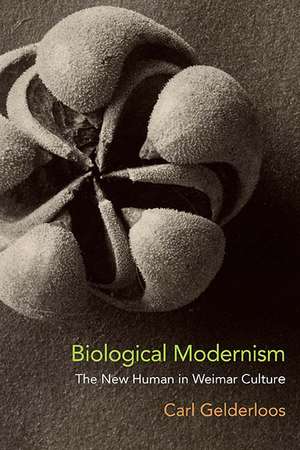Biological Modernism: The New Human in Weimar Culture
Autor Carl Gelderloosen Limba Engleză Paperback – 14 dec 2019
Honorable Mention for the DAAD/GSA Book Prize for the Best Book in Germanistik or Cultural Studies
Biological Modernism identifies an intellectual current in the Weimar Republic that drew on biology, organicism, vitalism, and other discourses associated with living nature in order to redefine the human being for a modern, technological age. Contrary to the assumption that any turn toward the organic indicated a reactionary flight from modernity or a longing for wholeness, Carl Gelderloos shows that biology and other discourses of living nature offered a nuanced way of theorizing modernity rather than fleeing from it. Organic life, instead of representing a stabilizing sense of wholeness, by the 1920s had become a scientific, philosophical, and disciplinary problem. In their work, figures such as Alfred Döblin, Ernst Jünger, Helmuth Plessner, and August Sander interrogated the relationships between technology, nature, and the human and radically reconsidered the relationship between the disciplines as well as the epistemological and political consequences for defining the human being. Biological Modernism will be of interest to scholars of German literature and culture, literary modernism, photography, philosophical anthropology, twentieth-century intellectual history, the politics of culture, and the history of science.
Biological Modernism identifies an intellectual current in the Weimar Republic that drew on biology, organicism, vitalism, and other discourses associated with living nature in order to redefine the human being for a modern, technological age. Contrary to the assumption that any turn toward the organic indicated a reactionary flight from modernity or a longing for wholeness, Carl Gelderloos shows that biology and other discourses of living nature offered a nuanced way of theorizing modernity rather than fleeing from it. Organic life, instead of representing a stabilizing sense of wholeness, by the 1920s had become a scientific, philosophical, and disciplinary problem. In their work, figures such as Alfred Döblin, Ernst Jünger, Helmuth Plessner, and August Sander interrogated the relationships between technology, nature, and the human and radically reconsidered the relationship between the disciplines as well as the epistemological and political consequences for defining the human being. Biological Modernism will be of interest to scholars of German literature and culture, literary modernism, photography, philosophical anthropology, twentieth-century intellectual history, the politics of culture, and the history of science.
| Toate formatele și edițiile | Preț | Express |
|---|---|---|
| Paperback (1) | 272.32 lei 6-8 săpt. | |
| Northwestern University Press – 14 dec 2019 | 272.32 lei 6-8 săpt. | |
| Hardback (1) | 697.08 lei 6-8 săpt. | |
| Northwestern University Press – 14 dec 2019 | 697.08 lei 6-8 săpt. |
Preț: 272.32 lei
Nou
Puncte Express: 408
Preț estimativ în valută:
52.11€ • 54.55$ • 43.12£
52.11€ • 54.55$ • 43.12£
Carte tipărită la comandă
Livrare economică 05-19 aprilie
Preluare comenzi: 021 569.72.76
Specificații
ISBN-13: 9780810141322
ISBN-10: 0810141329
Pagini: 240
Ilustrații: 12 b-w images
Dimensiuni: 152 x 229 x 30 mm
Greutate: 0.34 kg
Editura: Northwestern University Press
Colecția Northwestern University Press
ISBN-10: 0810141329
Pagini: 240
Ilustrații: 12 b-w images
Dimensiuni: 152 x 229 x 30 mm
Greutate: 0.34 kg
Editura: Northwestern University Press
Colecția Northwestern University Press
Notă biografică
CARL GELDERLOOS is an associate professor of German studies at Binghamton University.
Cuprins
Introduction: Modern German Culture in a Life Crisis
1. Helmuth Plessner’s Eccentric Human among the Disciplines
2. Photography's Natural Histories in the Weimar Republic
3. Döblin’s Epic Embodied
4. Organic Modernization: Wholeness and Development in Ernst Jünger’s The Worker
Conclusion
Notes
Index
1. Helmuth Plessner’s Eccentric Human among the Disciplines
2. Photography's Natural Histories in the Weimar Republic
3. Döblin’s Epic Embodied
4. Organic Modernization: Wholeness and Development in Ernst Jünger’s The Worker
Conclusion
Notes
Index
Descriere
Biological Modernism details how German writers during the Weimar Republic drew on discourses and tropes from the biological sciences to redefine the human being for a modern, technological age.
